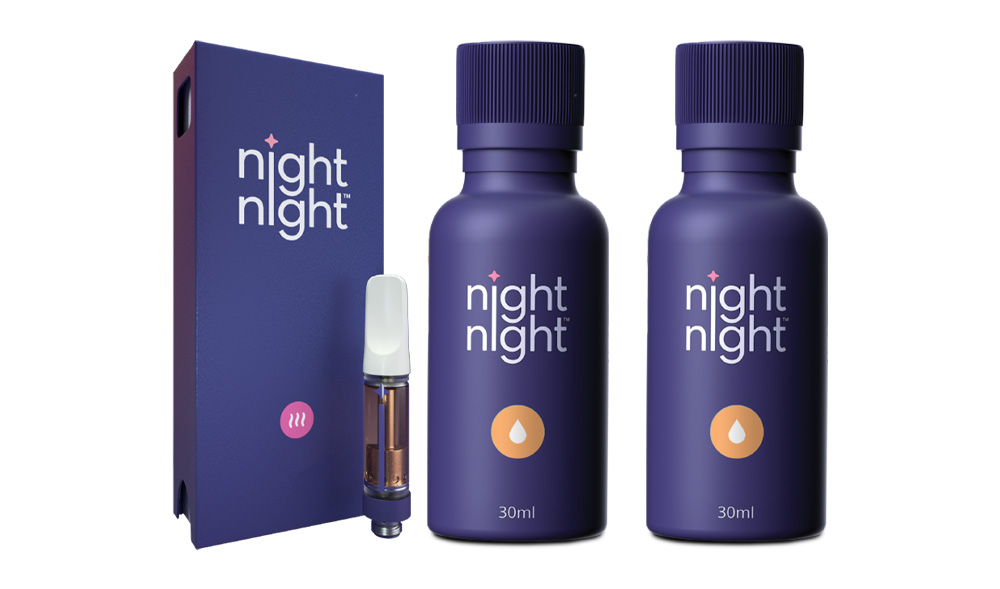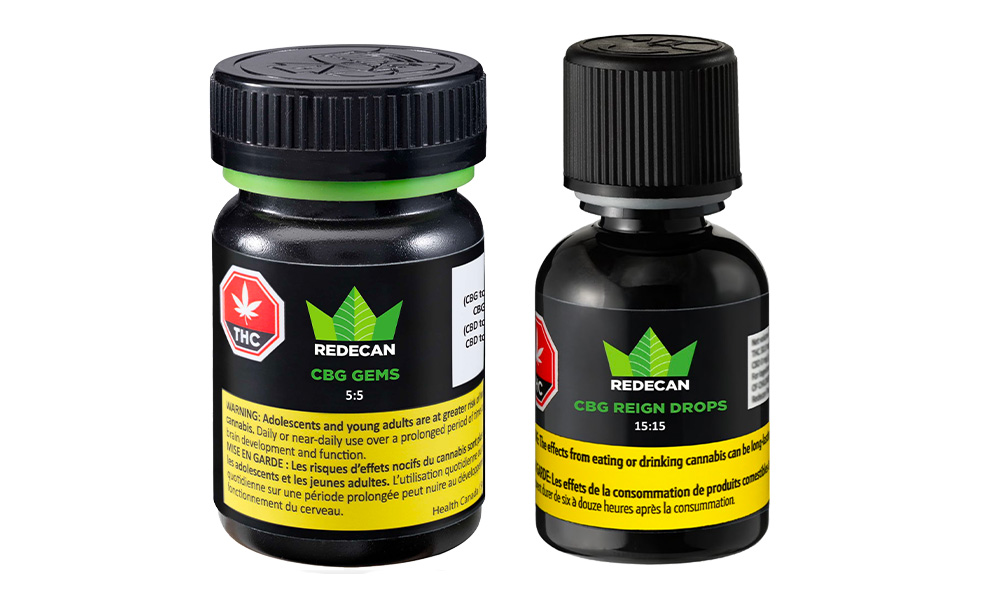When most people think about cannabis, they often know about the two main cannabinoids: THC and CBD. But cannabis is a complex plant with many other cannabinoids, each with its own unique effects. THCv, CBC, CBG, and CBN are lesser known “minor cannabinoids” that are becoming more present in the medical and recreational markets. Navigating between them all might seem tricky at first, but we have a few tips for making it easy.
What Are Cannabinoids?
Cannabinoids are natural compounds found in cannabis plants. These compounds interact with your body’s endocannabinoid system, which may impact things like mood, appetite, pain, and sleep. While THC and CBD are the most well-known cannabinoids, there are many others that may offer different benefits. Let’s take a closer look at some of these minor cannabinoids.
CBN (Cannabinol)
What is CBN? CBN is what THC turns into when it ages. It’s not as psychoactive as THC but may help with sleep – which is why our suite of NightNight products are CBN-focused.
Potential Effects:
• May improve sleep
• May act as a mild sedative
Remember This: CBN is known as the “sleep cannabinoid” and is often used to help with rest and relaxation.

CBG (Cannabigerol)
What is CBG? CBG is often called the “mother of all cannabinoids” because it is the building block for other cannabinoids like THC and CBD. CBG can be found in our Redecan Gems.
Potential Effects:
• May reduce inflammation and pain
• May help with digestive issues like IBD
• May support healthy eyes by lowering intraocular pressure (potentially helpful for diseases like glaucoma
Remember This: CBG is the “mother cannabinoid,” and it helps with inflammation and digestion.

THCv (Tetrahydrocannabivarin)
What is THCv? A cannabinoid similar to THC, but it works a little differently in your body. While THC is known for making people feel “high,” THCv may help reduce appetite and decrease inflammation.
Potential Effects:
• May reduce appetite (some call it the “diet weed”)
• May decrease signs of inflammation and inflammatory pain
• May help manage blood sugar levels
Remember This: THCv is like THC’s cousin that helps you reduce inflammation and won’t increase your appetite.
CBC (Cannabichromene)
What is CBC? CBC is a cannabinoid that doesn’t make you feel intoxicated. It’s being studied for its potential effects on inflammation and pain.
Potential Effects:
• May reduce pain and inflammation
• May support healthy brain function
• May improve mood and fight depression
Remember This: Think of CBC as the “wellness cannabinoid” that helps with pain and mood, without any psychoactive effects.
Tips to Remember the Differences
Here are some easy tips to keep these cannabinoids straight:
• CBN: Think “N” for night—it’s known for improving sleep.
• CBG: Think “G” for gut—it may help with digestion and overall wellness.
• THCv: Think “V” for variant with a vitality boost—it may trim hunger and calm inflammation.
• CBC: Think “C” for comfort—it may help with mood and inflammation.
Understanding the potential benefits of these minor cannabinoids can help you make informed choices about which products might be right for you. We believe in giving you the tools to better understand your health and wellness options. If you have any questions, don’t hesitate to ask one of our team members for more information.
This blog is for educational purposes only. Always consult with your Health Care Practitioner or contact us for more information.
Sources:
Russo, E. B. (2011). Taming THC: Potential cannabis synergy and phytocannabinoid-terpenoid entourage effects. British Journal of Pharmacology, 163(7), 1344–1364. https://doi.org/10.1111/j.1476-5381.2011.01238.x
Zou, S., & Kumar, U. (2018). Cannabinoid receptors and the endocannabinoid system: Signaling and function in the central nervous system. International Journal of Molecular Sciences, 19(3), 833. https://doi.org/10.3390/ijms19030833
McPartland, J. M., Duncan, M., Di Marzo, V., & Pertwee, R. G. (2015). Are cannabidiol and Δ9-tetrahydrocannabivarin negative modulators of the endocannabinoid system? A systematic review. British Journal of Pharmacology, 172(3), 737–753. https://doi.org/10.1111/bph.12944
Morales, P., Hurst, D. P., & Reggio, P. H. (2017). Molecular targets of the phytocannabinoids: A complex picture.
Schrot, R. J., & Hubbard, J. R. (2016). Cannabinoids: Medical implications. Annals of Medicine, 48(3), 128–141. https://doi.org/10.3109/07853890.2016.1145794
Bolognini, D., Costa, B., Maione, S., Comelli, F., Marini, P., Di Marzo, V., Parolaro, D., Ross, R.A., Gauson, L.A., Cascio, M.G. and Pertwee, R.G. (2010), The plant cannabinoid Δ9-tetrahydrocannabivarin can decrease signs of inflammation and inflammatory pain in mice. British Journal of Pharmacology, 160: 677-687. https://doi.org/10.1111/j.1476-5381.2010.00756.x
Noriko Shinjyo, Vincenzo Di Marzo, The effect of cannabichromene on adult neural stem/progenitor cells, Neurochemistry International, Volume 63, Issue 5, 2013, Pages 432-437, ISSN 0197-0186, https://doi.org/10.1016/j.neuint.2013.08.002.
Borrelli F, Fasolino I, Romano B, Capasso R, Maiello F, Coppola D, Orlando P, Battista G, Pagano E, Di Marzo V, Izzo AA. Beneficial effect of the non-psychotropic plant cannabinoid cannabigerol on experimental inflammatory bowel disease. Biochem Pharmacol. 2013 May 1;85(9):1306-16. doi: 10.1016/j.bcp.2013.01.017. Epub 2013 Feb 12. PMID: 23415610.
Nadolska K, Goś R. Mozliwości zastosowania kannabinoidów w leczeniu jaskry [Possibilities of applying cannabinoids’ in the treatment of glaucoma]. Klin Oczna. 2008;110(7-9):314-7. Polish. PMID: 19112869.
Qin N, Neeper MP, Liu Y, Hutchinson TL, Lubin ML, Flores CM. TRPV2 is activated by cannabidiol and mediates CGRP release in cultured rat dorsal root ganglion neurons. J Neurosci. 2008 Jun 11;28(24):6231-8. doi: 10.1523/JNEUROSCI.0504-08.2008. PMID: 18550765; PMCID: PMC6670541.
Tomida I, Pertwee RG, Azuara-Blanco A. Cannabinoids and glaucoma. Br J Ophthalmol. 2004 May;88(5):708-13. doi: 10.1136/bjo.2003.032250. PMID: 15090428; PMCID: PMC1772142.
Wargent, E., Zaibi, M., Silvestri, C. et al. The cannabinoid Δ9-tetrahydrocannabivarin (THCV) ameliorates insulin sensitivity in two mouse models of obesity. Nutr & Diabetes 3, e68 (2013). https://doi.org/10.1038/nutd.2013.9
El-Alfy AT, Ivey K, Robinson K, Ahmed S, Radwan M, Slade D, Khan I, ElSohly M, Ross S. Antidepressant-like effect of delta9-tetrahydrocannabinol and other cannabinoids isolated from Cannabis sativa L. Pharmacol Biochem Behav. 2010 Jun;95(4):434-42. doi: 10.1016/j.pbb.2010.03.004. Epub 2010 Mar 21. PMID: 20332000; PMCID: PMC2866040
Maione S, Piscitelli F, Gatta L, Vita D, De Petrocellis L, Palazzo E, de Novellis V, Di Marzo V. Non-psychoactive cannabinoids modulate the descending pathway of antinociception in anaesthetized rats through several mechanisms of action. Br J Pharmacol. 2011 Feb;162(3):584-96. doi: 10.1111/j.1476-5381.2010.01063.x. PMID: 20942863; PMCID: PMC3041249
Valeri A, Chiricosta L, D’Angiolini S, Pollastro F, Salamone S, Mazzon E. Cannabichromene Induces Neuronal Differentiation in NSC-34 Cells: Insights from Transcriptomic Analysis. Life (Basel). 2023 Mar 9;13(3):742. doi: 10.3390/life13030742. PMID: 36983897; PMCID: PMC10051538.







